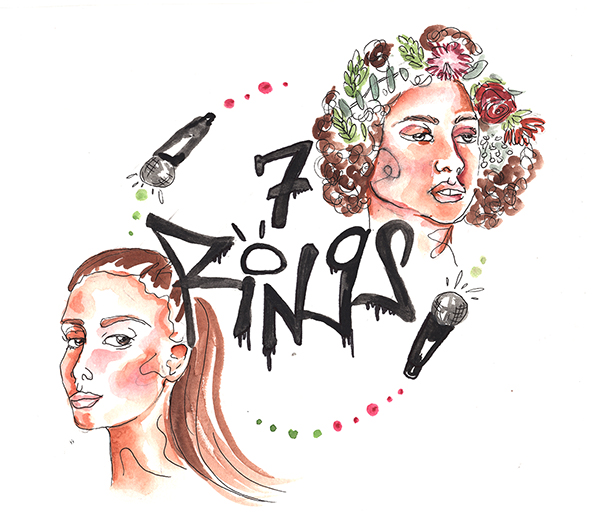There is no room for cultural appropriation in music
March 1, 2019
As Ariana Grande incessantly reminds us in “7 rings,” she’s single, famous and exorbitantly wealthy.
Since her breakup with comedian Pete Davidson, Grande has taken on a very public and inspiring single-girl persona who focuses on her friends, her work and, above all, herself.
“7 Rings” currently holds the No. 1 spot on the Billboard Top 100. Grande is all over Instagram, Twitter and all of my friends’ Spotify accounts. It seems as if none of us can escape from her extremely well-manicured claws.

I don’t like to hate on Grande, though I’ve grown significantly tired of her repeated message of wealth and consumerism. We get it. You want it, you got it.
In all honesty, I enjoyed “thank u, next” and “7 rings.” That is, until I refreshed my Instagram feed and saw Princess Nokia’s video in which she accuses Grande of plagiarism.
Nokia’s song “Mine” resembles the simplistic, poppy beat that runs throughout “7 rings,” though “Mine” was released almost two years prior to Grande’s single.
After the release of “7 rings,” Nokia posted a video on Instagram comparing the two.Nokia said, “Does that sound familiar to you? ’Cause that sound really familiar to me.”
“Mine” is a song about the respect that should be paid to women of color’s hair and the cultural significance that hair carries.
Nokia identifies as Puerto Rican. “Ain’t that the lil’ song I made about brown women and their hair? Hmmm. Sounds about white,” Nokia said in the since-deleted video.
Like many white artists, Grande has profited and built her empire off of material that minority communities invented.
It’s a tale as old as time. The white artist will also assume the “trendy” parts of minority identites to increase their fame. This is cultural appropriation.
Grande’s repetition of “I want it, I got it” sounds a little too close to Nokia’s refrain, “It’s mine, I bought it.” Nokia’s refrain refers to ignorant strangers asking WOC if their hair is “their real hair,” to which Nokia says, “It’s mine” because “I bought it.”
“You like my hair? Gee thanks, just bought it,” Grande rap-talks in the chorus of “7 rings.”
The problem with this line is that Grande uses the image of paid-for hair in this line. That very motif is one unique to people of color’s music because it represents the versatility and diversity of POC culture and more specifically, their hair.
A white woman paying for clip-in extensions is in no way comparable to this long-standing pattern, and demonstrates the cultural insensitivity that Grande repeatedly practices.
This isn’t to say that white women can’t get extensions; they do it all the time.
“Mine” ends with “Please do not ask me or any black or brown women if our hair is real or not. If it’s a wig, a weave, extensions, braids, don’t fucking ask. It’s very rude, it’s extremely personal to be put on the spot like that.”
While I’m sure Grande has strangers trying to touch her hair constantly, I doubt any of them ask her if it’s her “real hair” the same way that Nokia mentions.
If you ask me, Grande’s skin is sprayed a little too tan for a white girl, and the effect she puts on her voice has often been referred to as a fake “blaccent,” similar to that of now-defunct rapper Iggy Azalea.
There is absolutely no doubt in my mind that Grande, like many white artists, wants to be seen as trendy by abusing other races’ cultures for her own gain.
Whether or not you believe that “7 rings” was plagiarized directly from Nokia, the cultural insensitivity that Grande practices repeatedly represents the larger problem of appropriation in American pop culture.
Ask me which song I prefer. Is it the one about embracing diversity while also celebrating and defending the right for WOC to wear their hair how they choose without disrespectful comments from spectators, or is it Ari’s message of exorbitant wealth? I would pick the former every time.







